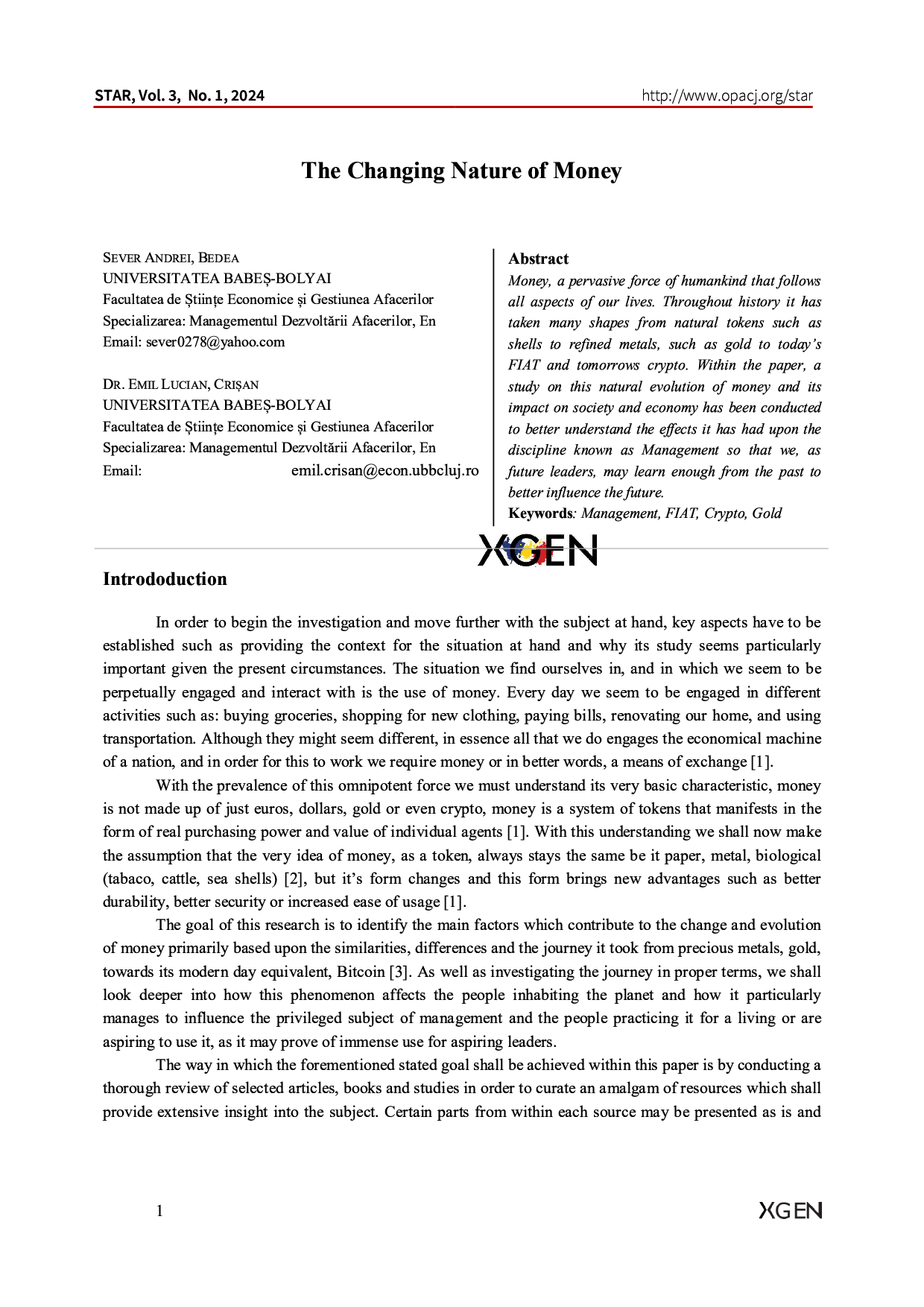
Date Log

This work is licensed under a Creative Commons Attribution-NonCommercial 4.0 International License.
The Changing Nature of Money
Corresponding Author(s) : SEVER ANDREI BEDEA
Student Thinkers and Advanced Research,
Vol. 3 No. 2 (2024): Proceedings of the 7th International Conference XGEN
Abstract
Money, a pervasive force of humankind that follows all aspects of our lives. Throughout history it has taken many shapes from natural tokens such as shells to refined metals, such as gold to today’s FIAT and tomorrows crypto. Within the paper, a study on this natural evolution of money and its impact on society and economy has been conducted to better understand the effects it has had upon the discipline known as Management so that we, as future leaders, may learn enough from the past to better influence the future.
Keywords
Download Citation
Endnote/Zotero/Mendeley (RIS)BibTeX
- S. M. Focardi, Money: What It Is, How It’s Created, Who Gets It, and Why It Matters, 1st ed. Abingdon, Oxon ; New York, NY : Routledge, 2018. | Series: Economics in the real world: Routledge, 2018. doi: 10.4324/9781315391069., New York, NY : Routledge, 2018.
- The Investopedia Team, “Investopedia,” 30 09 2023. [Online]. Available: https://www.investopedia.com/terms/m/money.asp. [Accessed 02 04 2024].
- The Economist, “Cryptocurrencies and blockchains,” The Economist, vol. 428, no. 9107, p. 38, 2018.
- R. W. a. J. Watherford, “The History of Money: From Sandstone to Cyberspace,” The Journal of the Royal Anthropological Institute, vol. 4, no. 2, p. 362, 1998.
- F. Mikael, Shell Money: A Comparative Study, Cambridge: Cambridge University Press, 2024.
- A. H. M. Jones, “Inflation under the Roman Empire,” The Economic History Review, vol. V, no. 3, pp. 293-318, 2016.
- S. M. Breugelmans and M. Zeelenberg, “The good, bad and ugly dispositional greed,” Current Opinion in Psychology, vol. 46, 2022.
- L. Workman, “The British Psychological Society,” The British Psychological Society, 04 12 2017. [Online]. Available: https://www.bps.org.uk/psychologist/people-need-period-stability-otherwise-they-may-actively-resist-beneficial-change. [Accessed 03 04 2024].
- A. H. Maslow, A Theory of Human Motivation, Dancing Unicorn Books, 2017.
- J. S. Little and R. K. Triest, “Seismic Shifts: The Economic Impact of the Demographic Change. An Overview,” Economic Research Conference, no. 47, pp. 1-29, 2001.
- “IMF,” International Monetary Fund, [Online]. Available: https://www.imf.org/external/np/exr/center/mm/eng/mm_rs_03.htm. [Accessed 03 04 2024].
- M. Webber, V. Elfving, S. Weidt and W. K. Hensinger, “The impact of hardware specifications on reaching quantum advantage in the fault tolerant regime,” AVS Quantum Science, vol. IV, no. 1, pp. 013801-1-15, 2022.
- “Markets in Crypto-Assets Regulation (MiCA),” European Securities and Markets Authority, [Online]. Available: https://www.esma.europa.eu/esmas-activities/digital-finance-and-innovation/markets-crypto-assets-regulation-mica. [Accessed 03 04 2024].
References
S. M. Focardi, Money: What It Is, How It’s Created, Who Gets It, and Why It Matters, 1st ed. Abingdon, Oxon ; New York, NY : Routledge, 2018. | Series: Economics in the real world: Routledge, 2018. doi: 10.4324/9781315391069., New York, NY : Routledge, 2018.
The Investopedia Team, “Investopedia,” 30 09 2023. [Online]. Available: https://www.investopedia.com/terms/m/money.asp. [Accessed 02 04 2024].
The Economist, “Cryptocurrencies and blockchains,” The Economist, vol. 428, no. 9107, p. 38, 2018.
R. W. a. J. Watherford, “The History of Money: From Sandstone to Cyberspace,” The Journal of the Royal Anthropological Institute, vol. 4, no. 2, p. 362, 1998.
F. Mikael, Shell Money: A Comparative Study, Cambridge: Cambridge University Press, 2024.
A. H. M. Jones, “Inflation under the Roman Empire,” The Economic History Review, vol. V, no. 3, pp. 293-318, 2016.
S. M. Breugelmans and M. Zeelenberg, “The good, bad and ugly dispositional greed,” Current Opinion in Psychology, vol. 46, 2022.
L. Workman, “The British Psychological Society,” The British Psychological Society, 04 12 2017. [Online]. Available: https://www.bps.org.uk/psychologist/people-need-period-stability-otherwise-they-may-actively-resist-beneficial-change. [Accessed 03 04 2024].
A. H. Maslow, A Theory of Human Motivation, Dancing Unicorn Books, 2017.
J. S. Little and R. K. Triest, “Seismic Shifts: The Economic Impact of the Demographic Change. An Overview,” Economic Research Conference, no. 47, pp. 1-29, 2001.
“IMF,” International Monetary Fund, [Online]. Available: https://www.imf.org/external/np/exr/center/mm/eng/mm_rs_03.htm. [Accessed 03 04 2024].
M. Webber, V. Elfving, S. Weidt and W. K. Hensinger, “The impact of hardware specifications on reaching quantum advantage in the fault tolerant regime,” AVS Quantum Science, vol. IV, no. 1, pp. 013801-1-15, 2022.
“Markets in Crypto-Assets Regulation (MiCA),” European Securities and Markets Authority, [Online]. Available: https://www.esma.europa.eu/esmas-activities/digital-finance-and-innovation/markets-crypto-assets-regulation-mica. [Accessed 03 04 2024].